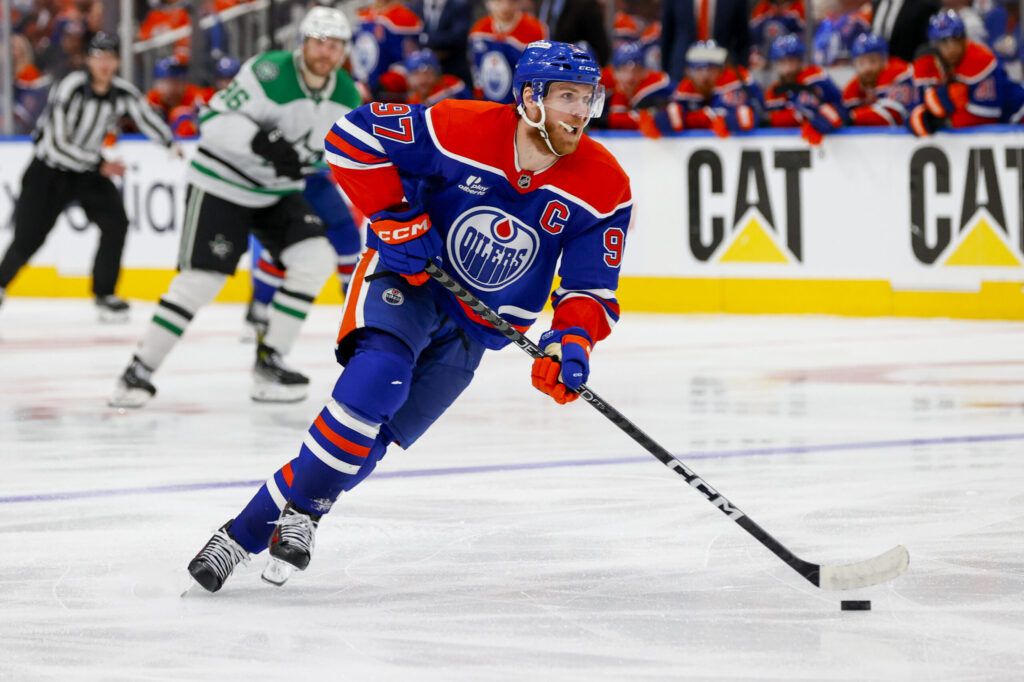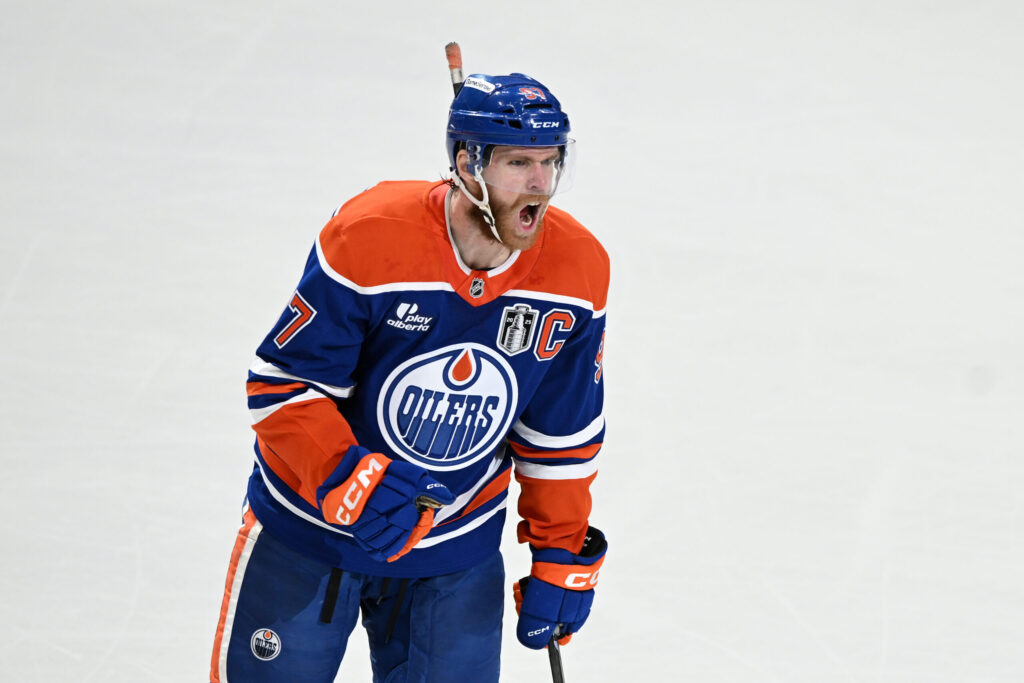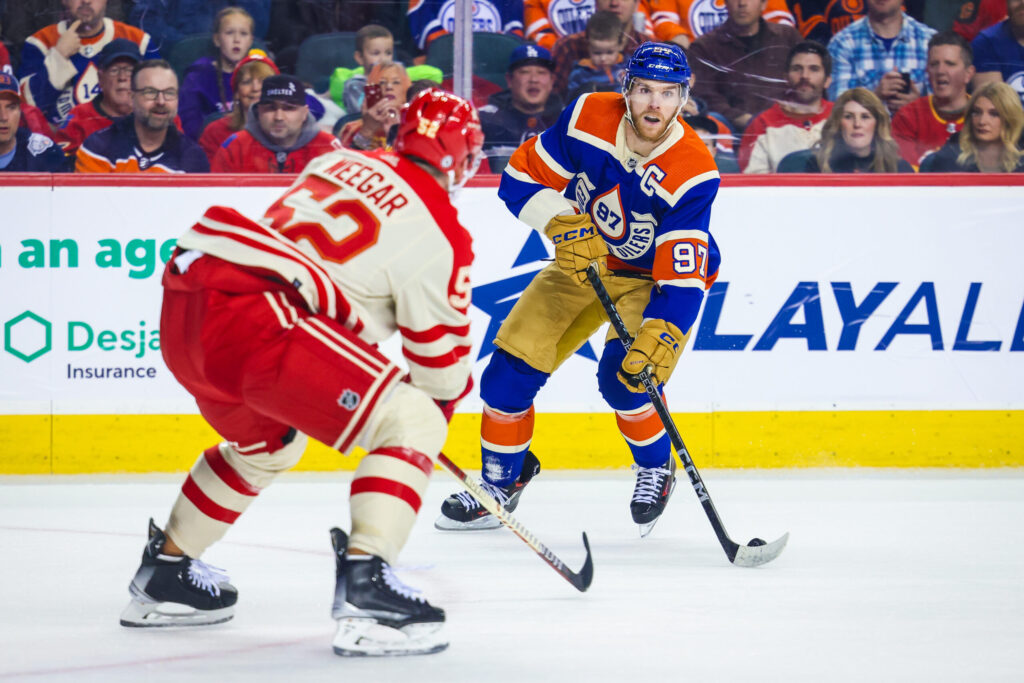In the world of professional hockey, some negotiations are simple arithmetic. A player produces X, the market dictates Y, and a deal is struck. Then there is the stratosphere inhabited by Connor McDavid, where the math becomes something closer to quantum physics, involving variables of legacy, loyalty, and the relentless pursuit of a championship that has remained agonizingly out of reach. As the Edmonton Oilers captain enters the final year of his eight-year, $100 million contract, the silence from his camp isn’t a sign of indecision; it’s the sound of meticulous calculation. This isn’t a negotiation; it’s a referendum on the future of a franchise, and the entire league is watching.
Also on the EDGE – The Battles That Will Define the Edmonton Oilers’ 2025-26 Training Camp
The Player’s Prerogative: Winning Over Wages
For McDavid, the sting of two consecutive Stanley Cup Final losses has crystallized his priorities. Sources close to the player suggest he has become “even more fanatical about winning,” a terrifying prospect for opponents given his already legendary work ethic. This fanaticism is the driving force behind the current contract talks—or lack thereof.
This isn’t a holdout for more money. In fact, McDavid has been clear that this negotiation is “not about trying to make the most amount of money.” Instead, he’s engaged in what Oilers’ hockey boss Jeff Jackson aptly calls an attempt to “find the razor’s edge.” McDavid is trying to thread an impossibly small needle: securing a contract that reflects his status as the game’s preeminent talent while simultaneously leaving enough salary cap flexibility for the Oilers to build a sustainable contender around him.

It’s a level of long-term strategic thinking that mirrors his on-ice vision. He’s not just looking at the next shift; he’s looking at the roster composition in 2028. He’s confident in the group’s ability to win “this year,” but he acknowledges that no one has a “crystal ball” for what the team will look like in three, four, or five years. By delaying his extension, McDavid is implicitly challenging management to show him a blueprint for sustained success, not just a one-year, all-in push.
A Matter of Term and a Confident Front Office
From the Oilers’ management suite, the public-facing message is one of calm assurance. Jeff Jackson has expressed confidence that a deal will get done, stating the front office is “not nervous about it.” Yet, beneath that cool exterior, there are hints of complexity. Jackson admitted that the “term is still an issue,” a significant sticking point in any negotiation of this magnitude.
Does McDavid opt for a shorter-term deal, perhaps three to five years, allowing him another chance to reassess the landscape in his early 30s? Or does he commit to a full eight-year term, tying his entire prime to the city of Edmonton? Each path carries its own set of risks and rewards for both player and team.
This uncertainty has fueled a cottage industry of speculation among hockey insiders. While some predicted a deal would be signed before the summer was out, others, like NHL insider John Shannon, suggested McDavid would likely enter the season without a new contract, a scenario that undoubtedly causes a few sleepless nights within the organization, no matter their public posture.
The NHLPA and the Thirty-One Sharks
This negotiation doesn’t exist in a vacuum. The NHL Players’ Association is reportedly “quietly” encouraging McDavid not to take a significant hometown discount. As the league’s standard-bearer, his contract will set the market for the next wave of superstars. A suppressed McDavid contract could have a deflationary effect on star salaries league-wide. However, in a hard-cap system, this argument has its limits. More money for one player on a team simply means less for the others on that same roster.
Meanwhile, the other 31 NHL general managers are watching with bated breath. Sportsnet’s Elliotte Friedman noted the “contract standstill” is “raising eyebrows across the NHL.” The longer McDavid goes unsigned, the more rival executives will start “evaluating their chances” of landing the ultimate prize if he were to hit unrestricted free agency in July 2026. Teams may already be clearing future cap space, just in case a 1% chance becomes a 5% chance.
The $50 Million Man in a $19 Million System
To truly understand the “razor’s edge” McDavid is walking, one must appreciate the financial absurdity of the NHL’s hard salary cap. Under the current system, the maximum McDavid could earn is 20% of the team’s cap, which projects to roughly $19.1 million per year. While a staggering sum, it pales in comparison to his theoretical value in a free market.

Friedman speculated that in a “much freer market situation,” the Oilers would gladly pay McDavid $50 million per year. This isn’t hyperbole. When compared to the top earners in other major North American sports as a percentage of team revenue, McDavid’s value is astronomical. His on-ice impact is arguably greater than any single player in baseball, basketball, or football. If his earnings were proportional to those of Stephen Curry (NBA) or Juan Soto (MLB), his salary could range from $27 million to a mind-boggling $95 million. In a system without a hard cap, a $50 million salary isn’t just possible; it’s logical. This is the financial leverage he is willingly sacrificing in the name of winning.
Also on the EDGE – The McDavid Watch: What’s the Oilers’ Holdup, and What’s the Payday Gonna Be?
Scrutinizing the Blueprint
So, if it’s not about the money, what is the delay truly about? It may be a quiet, superstar-sized audit of the front office’s long-term vision. Recent history provides some cause for concern. The Oilers’ inability to match offer sheets for promising young players like Dylan Holloway and Philip Broberg, who are now with the St. Louis Blues, was a significant blow to the team’s pipeline of cost-controlled young talent.
Furthermore, the additions of veterans Jeff Skinner and Viktor Arvidsson last offseason didn’t yield the desired results, and nagging questions about goaltending consistency persist. After two soul-crushing defeats in the Final, where injuries to key players like Zack Hyman and Mattias Ekholm played a role, McDavid may be critically evaluating whether the organization has the depth and the acumen to finally get over the hump. The longer these negotiations drag on, the more it feels like McDavid is making the team prove its long-term viability.
Ultimately, McDavid holds all the cards. He is comfortable entering the season without a new deal, confident that his focus and that of his teammates will remain on the ice. But for the Oilers’ brass and their fans, the clock is ticking. This isn’t just about retaining the best player in the world; it’s about validating a vision for a perennial champion. And McDavid, in his calculated silence, is waiting for the proof.
Created with the aid of Gemini AI
